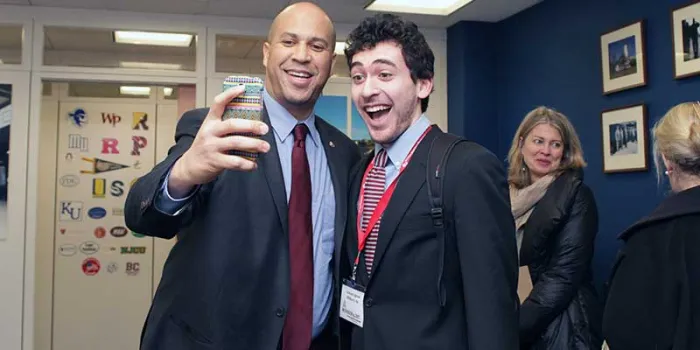If you have a child with a bleeding disorder, you may not know it, but advocacy is something you do all the time. When you push for the best healthcare for him or her, you’re being an advocate. But have you considered becoming an advocate for the greater bleeding disorders community and participating in state or national advocacy day events?
While it might seem daunting if you’ve never done it before, becoming an advocate for the bleeding disorders community is a lot easier than you think, says Nathan Schaefer, senior policy director at the National Hemophilia Foundation (NHF).
“In reality, if you’re a parent of a child with a bleeding disorder, you’re already advocating for our community everywhere you go, every single day,” says Schaefer. “Every time you’re out in public with your child—for instance at the grocery store where a stranger might comment on your child’s bruises—your explanations help people better understand what it’s like to live with a bleeding disorder.”
Ready to make your voice heard and inspire change? Here’s what you need to know to get started:
Attend Washington Days
The premier national advocacy event for the bleeding disorders community is NHF’s annual Washington Days, which will take place March 27-29, 2019, on Capitol Hill in Washington, DC. The event is an opportunity for people across the country to meet with legislators and congressional staff members to advocate on key federal issues, such as Medicare, the Affordable Care Act and funding for bleeding disorders programs at hemophilia treatment centers (HTCs).
Learn more and register for Washington Days.
Contact your local chapter
Call or email your local NHF chapter to let them know of your interest in advocacy efforts organized by chapters at the state and local level. These events are just as important as national ones since many facets of health insurance, including prescription drug formulary pricing and access to Medicaid, are decided at the state level. “The events at the state level also include less travel and new advocates report they are much less intimidating than Washington. In short, it’s a great way to get your ‘advocacy feet’ wet,” says Schaefer.
Relax, you can do this!
The thought of meeting with state or national representatives might seem intimidating, especially if you tend to be more of an introvert. But Schaefer says most families who participate in advocacy events tell him the experience is much easier than they expected.
“At the end of the day, parents will report back that it’s really not any different than talking to their neighbor or co-worker about the serious medical issues their children have faced, or about important milestones, such as when their child first learned to self-infuse,” says Schaefer.
Add some kid power!
Consider bringing your children with you to an advocacy event. Even young children can be incredibly effective advocates, and some local chapters even have specific young advocacy programs.
Children are often able to tell a powerful story about their experience without saying very many words, says Schaefer. For instance, a child just showing his or her port can convey the complexities of day-to-day living with a bleeding disorder. Young advocates might bring a photo of a particularly difficult bleed and explain what that experience was like.
Schaefer recalls a 5-year-old Washington Days participant from a few years ago who visited legislators with his mother. “He sat quietly off to the side and played a game where he was drawing shapes on his iPad. It looked like it was just a game to keep him occupied during the meetings. But then his mother explained that he had such a terrible bleed in his left elbow that he had to be hospitalized for several weeks and lost the ability to use his left arm. What he was doing was helping him regain the ability to use his left arm.”
The legislators who heard the story were “overwhelmed,” recalls Schaefer. “It left them with a very deep appreciation and concern for what it’s like to live with a bleeding disorder.”
If you have a school-age child and you’re worried about the school objecting to him or her missing class to participate in advocacy events, Schaefer suggests contacting your child’s teacher and explaining what your child will be doing while out of school.
“Your child’s teacher may be very positive and excited about this experience, and may even encourage your child to get extra credit by coming back and talking to their classmates about what it was like to go to the state capital and talk to your legislators,” says Schaefer.

